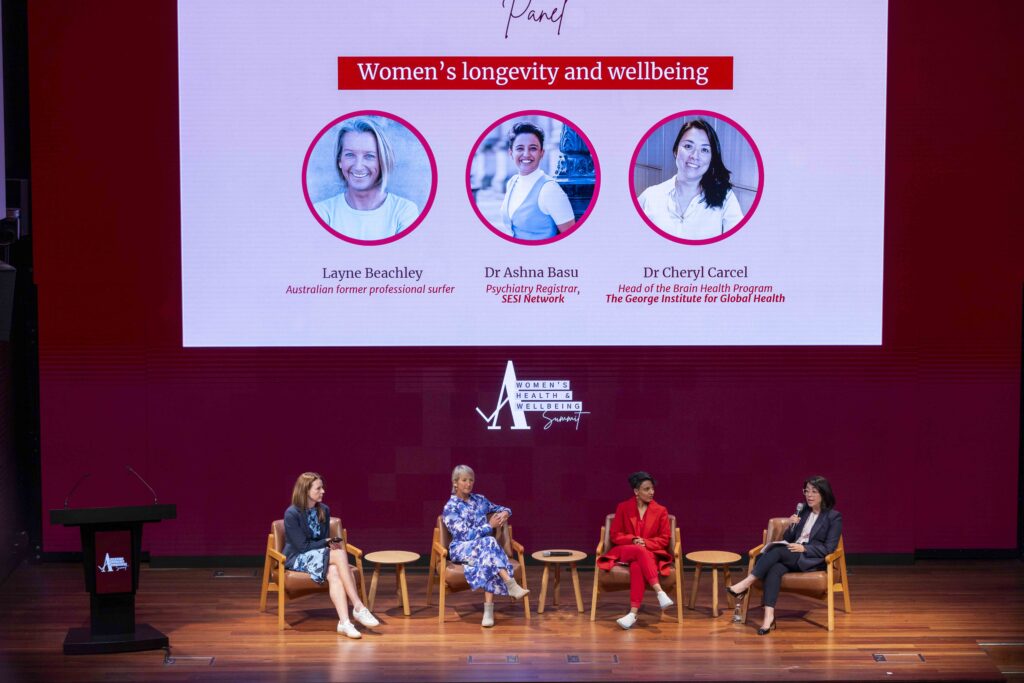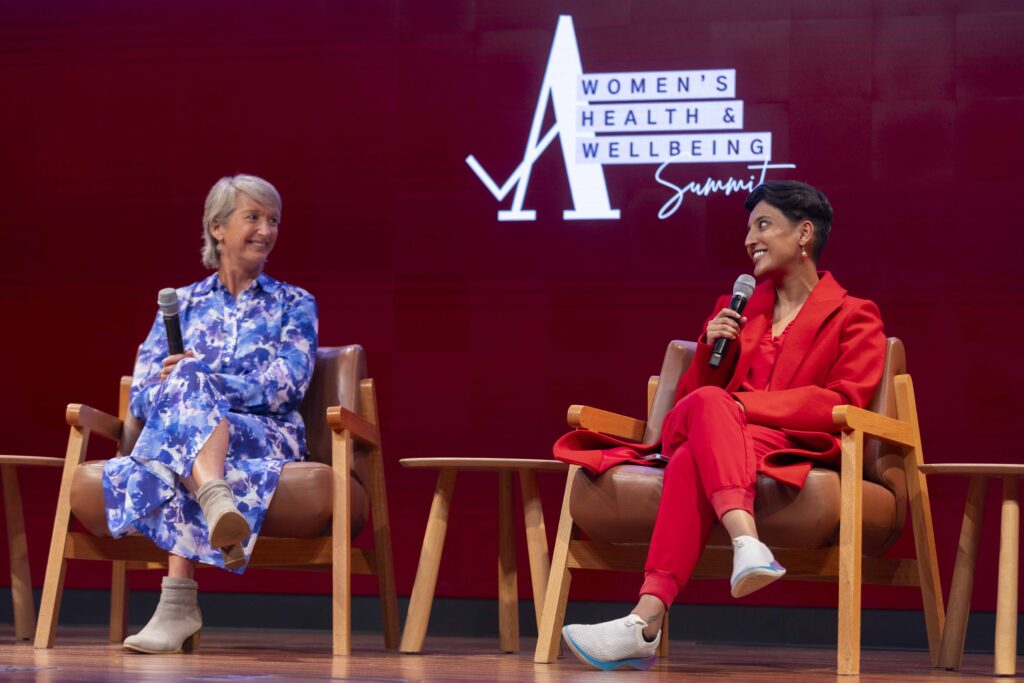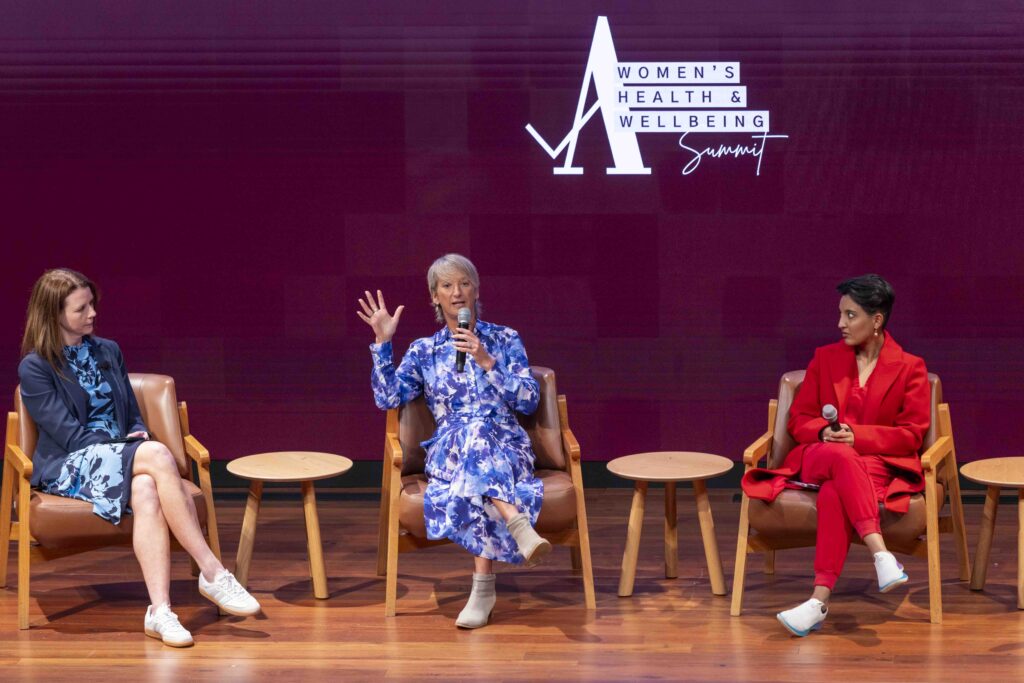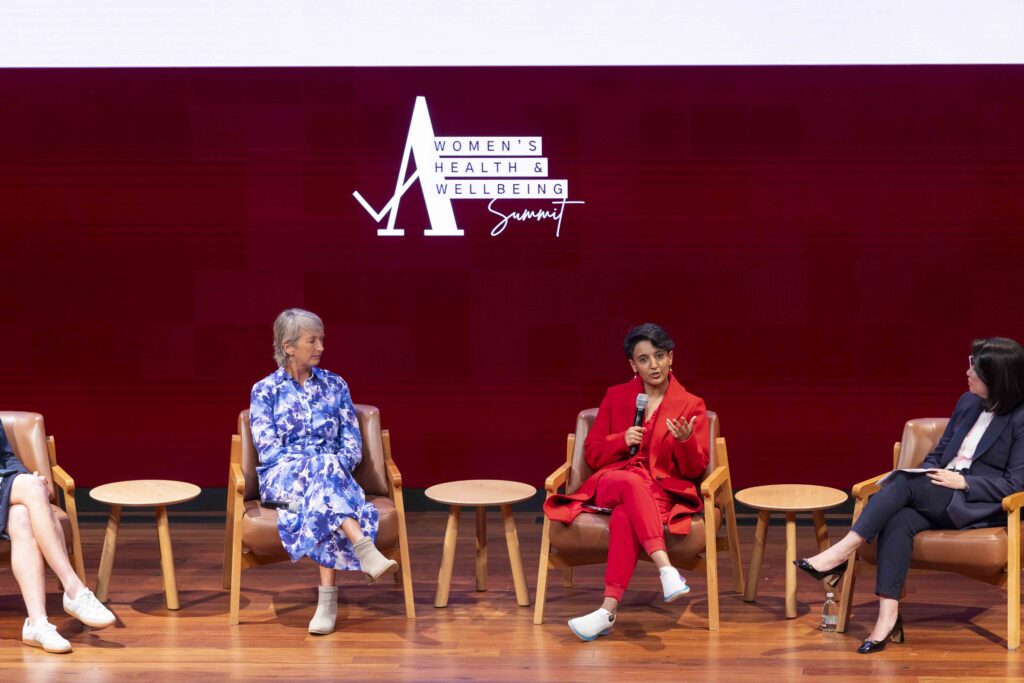How do we live healthier, happier and for longer? It’s a question many are considering these days, and one that, more often than not, is answered by a man with a podcast and a new line of supplements to purchase.
But on Wednesday, we put this question to three expert panellists at the Women’s Agenda Health and Wellbeing Summit.
The Longevity and Wellbeing session heard from 6x World Champion surfer Layne Beachley AO, Dr Ashna Basu, and Dr Cheryl Carcel, busting myths about living longer and the power of taking time for yourself to boost your overall wellbeing.
Stroke, medical misogyny and boosting longevity: Dr Cheryl Carcel
Every year, more women than men are dying from stroke. According to data from the Australian Institute of Health and Welfare, two thirds of stroke victims are women.
And it’s not just impacting older people – it’s affecting young women too. Misconceptions regarding who suffers from stroke as well as a lack of education around the differences in symptoms experienced by men and women — just like around other things like heart disease — could be standing in the way of women getting the urgent care they need.
Associate Professor Cheryl Carcel is the Head of the Brain Health Program at The George Institute for Global Health and a practising neurologist. She specialises in stroke and brain health and brings a sex and gender lens into the work she does.
“Stroke is known as a disease for older people, (but) it can happen in young people,” Dr Carcel said.

In fact, a study she conducted at the George Institute for Global Health found young women who presented with symptoms of a stroke were not believed or recognised by paramedics as having a stroke.
“That means they weren’t immediately brought to hospital, they weren’t given life-changing medication,” Dr Carcel said.
From her perspective as a clinician, Dr Carcel defines longevity as “reducing morbidity and mortality – but also improving the quality of life”.
Women are incredibly underrepresented in medical research and clinical trials, which presents an “equity issue” for women accessing life-saving drugs for conditions, including stroke, Dr Carcel said. This has a huge impact on women’s longevity and wellbeing.
“Women can’t access drugs if they’re not actually tested in women,” she said.
Mental health, loneliness and women’s longevity: Dr Ashna Basu
“What’s not impacting women’s mental health?” Dr Ashna Basu said.
Dr Basu is a doctor and award-winning global advocate for gender equity in health and society, treating women who are suffering from mental health and psychiatric conditions.
When she treats patients, Dr Basu considers what she calls “bio-social-psycho” factors, considering the whole context of the woman in front of her before treatment.

Some of those factors include whether a woman is lonely – and there are two main types of loneliness she often sees.
The first is physical loneliness – that is, not having people around them.
Yesterday, Women’s Agenda released the results of our 2024 Women’s Health survey, polling more than 1,000 women in Australia in August, on what they perceive is supporting and hindering their mental and physical health.
More than three quarters (76 per cent) of women polled said that friends contribute positively to their health, more than any other option presented in the survey.
“Women often do have a community around them that can rally, so that’s protective,” Dr Basu said.
But there’s another type of loneliness that can happen even if you are surrounded by people.
“You’re kind of just ‘mum’, and you’re not a person with your own wants and needs,” Dr Basu said.
“Not being seen and valued – that’s an incredibly lonely experience.”
Five-step solution: Layne Beachley
When Layne Beachley AO was a professional athlete, she pushed herself to limits beyond her capacity. As a result, she developed chronic fatigue syndrome.
Now, she is inspiring others to advocate for themselves – and to consider the cost when you push yourself too far.

“That starts with embracing where you’re at – embracing the body you’re in, and embracing the type of physicality you can do,” Beachley said.
“It’s one thing to pursue something, but we’ve got to start considering what the cost of that is. What are you ignoring in the pursuit of success? Is it worth it?”
In fact, Beachley advocated for herself right before arriving at the Women’s Health Summit. Being away from the ocean for three days took a toll on her, so she decided to go for a surf.
“I’m like a fish out of water when I haven’t been in the ocean,” Beachley said.
“If my job is to show up and inspire and empower others, I can’t do that authentically until I’ve done that for myself.”
For Beachley, her answer to longevity is a simple five-step morning routine.
Step one is box breathing: four breaths in, hold for four, four breaths out, hold for four. Next, an “I AM” mantra. Layne’s “I AM” mantra sounds like: “I am happy, I am abundant.”
The third step is to make your bed – every day. This gives a feeling of accomplishment, achieving something so simple to kickstart your day.
Step four is to brush your teeth with your non-dominant hand. It’s an exercise that is often given to stroke patients to exercise and “wake-up” neurons that aren’t normally used every day.
And finally, the last step is to drink a large glass of water. People can lose up to a litre of water overnight, so it is important to start your day hydrated and fresh for the morning.

The simple things
Above all, the panellists noted the importance of taking time for yourself – of doing something not to be productive, but just because you like doing it.
For Dr Cheryl Carcel, it’s martial arts. As if being a neurologist isn’t impressive enough, she’s also a red belt in taekwondo. But Dr Carcel doesn’t perform martial arts for anything other than the enjoyment and the time she takes outside of her life to practice.
Dr Ashna Basu has just gotten back into singing lessons. She says it’s an hour a week that she can’t swap, change or do anything within that time frame other than her one-on-one lesson with her singing tutor. Dr Basu describes herself as someone who strives to be an overachiever, but says she isn’t focusing on overachieving when she sings: her singing lessons, as well as the concerts she gets to do every so often, are moments for pure leisure.
And for Layne Beachley, why wouldn’t it be anything other than surfing? While it used to be her profession, surfing is now part of Beachley’s daily routine, a mindful moment for herself. Just Layne, and the waves.



